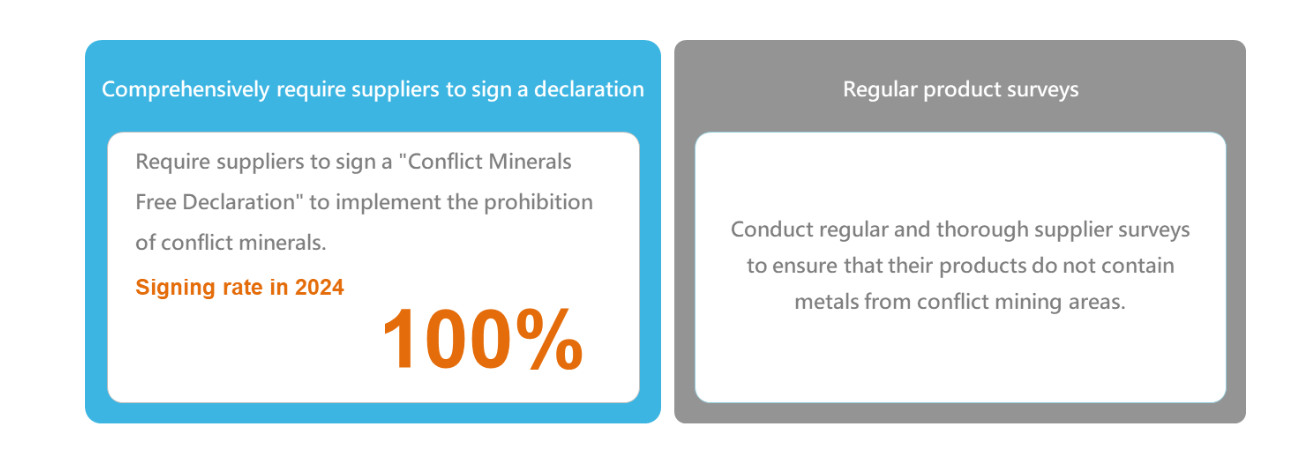Darfon Electronics has established a conflict-free minerals policy and responsible mineral sourcing management process to achieve responsible and sustainable sourcing. We commit to using minerals sourced in accordance with recognized due diligence frameworks such as the Organization for Economic Cooperation and Development (OECD) "Due Diligence Guidance for Supply Chains of Minerals from Conflict-Affected and High-Risk Areas." We regularly conduct due diligence on our suppliers to identify smelters and refiners that can be verified as having responsible mineral sourcing systems that meet current global standards, and prohibit the use of conflict minerals originating from high-risk areas.
Conflict-Free Mineral Management
Darfon Electronics supports the Responsible Minerals Initiative (RMI) and strictly adheres to the OECD Due Diligence Guidance for Supply Chains of Minerals from Conflict-Affected and High-Risk Areas and the RBA (formerly EICC) Code of Conduct. We implement prudent management of mineral sources and explicitly prohibit the use of any minerals mined in conflict zones by armed groups that commit serious human rights violations (i.e., "conflict minerals"), including tantalum (Ta), tin (Sn), tungsten (W), gold (Au), and other high-risk raw materials such as cobalt (Co) and palladium (Pd). We also conduct rigorous due diligence on the procurement and production and sales supply chains of these minerals to ensure that their sources meet OECD requirements or exclude minerals from conflict-affected and high-risk areas as defined by similarly recognized organizations.
To ensure that the mineral sources in our supply chain are free of human rights risks and illicit financial flows, Darfur annually reassesses the list of smelters and refiners currently used in Darfur products, based on the Conformant Smelters List published on the RBA's official website. We also systematically manage conflict minerals through questionnaires and audits conducted on our supplier survey platform. Furthermore, we conduct surveys using the RMI's Conflict Minerals Reporting Template and Extended Minerals Reporting Template (CMRT and EMRT), requiring suppliers to disclose the source of their minerals and sign a non-conflict minerals declaration. This ensures that suppliers' procurement sources are not sourced from conflict or high-risk areas and comply with customer and regulatory requirements.

Conflict-Free Minerals Sourcing Policy
Darfon's conflict-free minerals management process requires confirming with suppliers the reasons and necessity for using conflict minerals. If the use is non-essential, suppliers will be required to cease sourcing and using conflict minerals, select new mineral sources, and provide valid evidence demonstrating that the new minerals are conflict-free and meet RBA requirements. If the use is essential, suppliers will be required to propose removal plans or corrective measures.
To protect human rights, health, and the environment in regions where materials are produced, Darfon has pledged to expand its investigation and disclosure scope in accordance with the Responsible Minerals Initiative (RMI) guidelines, gradually including more minerals from conflict-affected and high-risk areas (CAHRAs), such as cobalt and mica. All suppliers are required to adhere to the following guidelines to continuously strengthen their responsible sourcing program.
- We actively investigate and verify our supply chain to ensure transparency and adhere to Darfon's conflict-free sourcing goals.
- We comply with regional and international regulations on conflict minerals.
- Adhere to industry standards for sourcing and reporting conflict minerals.
- Strive to provide formal assurance of correct conflict-free minerals.



